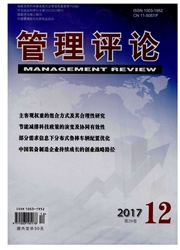

 中文摘要:
中文摘要:
越来越多的退休人员在虚拟社区分享信息及知识,但以往研究多针对年轻人及企业员工,相关结论无法很好解释退休人员的知识贡献行为。基于社会认知理论,文章分析了环境及认知两方面的因素,将其他用户的参与行为作为环境因素,自我效能及期望收益作为认知因素,分析了它们对退休人员知识贡献的影响。实证结果显示:上述三种因素不仅会直接影响到退休人员的知识贡献行为,且自我效能及期望收益作为认知因素,还会对环境因素的影响起到双向的调节作用。文章扩展了在线知识管理的研究对象,发现了自我效能的负向替代效应及期望收益的正向补充效应,对于开发老年人力资源及鼓励退休人员积极老龄化有一定的实践启示。
 英文摘要:
英文摘要:
Retirees are increasingly engaging in information and knowledge sharing activities in virtual communities, but prior studies mainly focus onyoung people or employees. It isn' t appropriate to explain retirees' knowledge sharing behavior using the data based on young people or employees. Based on social cognitive theory, this paper identifies the potential environmental and cognitive factors, and treats other members' participation in a virtual community as environmental factor, self-efficacy and outcome expectation as cognitive factors, analyzing their effects on a focal retiree' s knowledge contribution behavior in the same virtual community. The empirical results show that these three factors not only affect a focal retiree' s knowledge contribution behavior directly ; furthermore, the two cognitive factors have a moderating effect on the environmental factor' s effect. This paper verifies two contradictory effects: self-efficacy' s substitutive effect and outcome expectation' s complementary effect, which is less mentioned in prior researches; moreover, those findings also shed light on developing senior human resource and encouraging active aging for retirees.
 同期刊论文项目
同期刊论文项目
 同项目期刊论文
同项目期刊论文
 期刊信息
期刊信息
